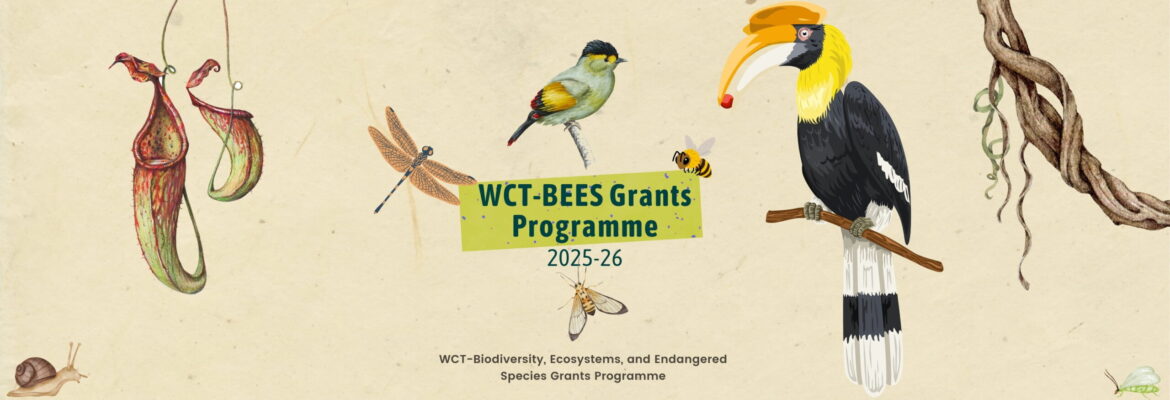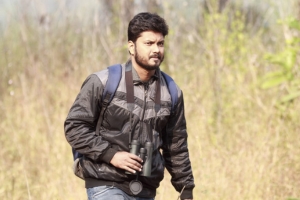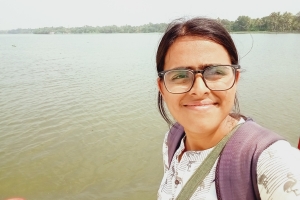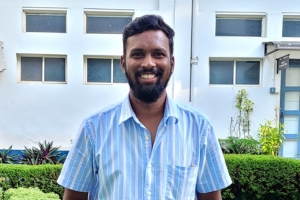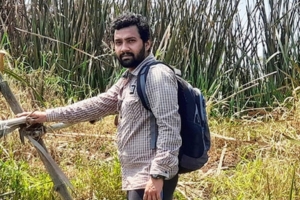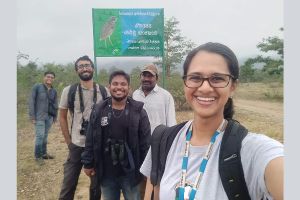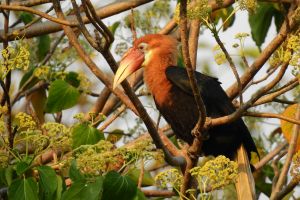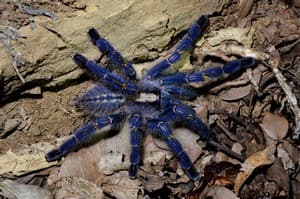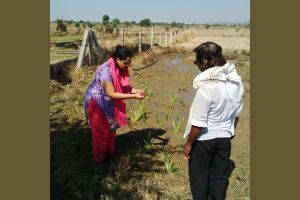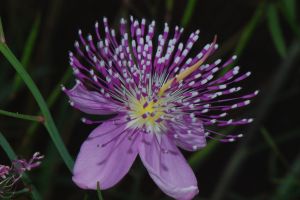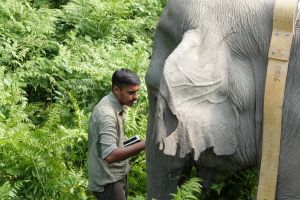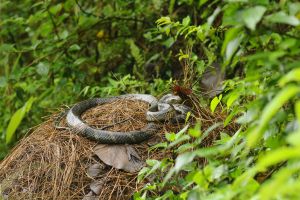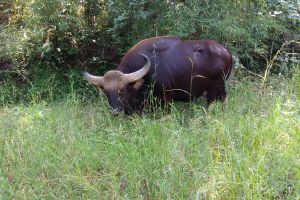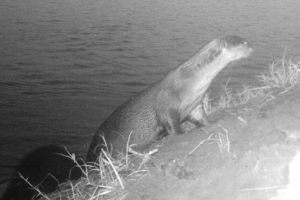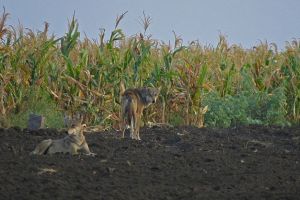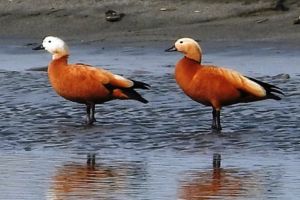The WCT-Biodiversity, Ecosystems, and Endangered Species Grants Programme (WCT-BEES Grants) aims to support critical conservation research and grassroots projects by awarding small grants to promising researchers, conservationists, and conservation organisations. The objective of our small grants programme is to encourage and strengthen on-ground nature conservation work in India.
We are no longer accepting applications for the WCT-BEES Grants Programme 2025-26.
WCT instituted the small grants programme to provide financial aid for the conservation of endangered species and critical habitats, and to address conservation issues. It does this by supporting organisations, motivated individuals, and researchers in carrying out conservation work in India.
Through the WCT-Biodiversity, Ecosystems, and Endangered Species Grants Programme (WCT-BEES Grants Programme), WCT provides support and opportunities to conservationists and researchers to pursue their passion for conserving endangered species and threatened habitats.
Two types of grants will be provided under the WCT-BEES Grants programme:
- Wildlife Research Small Grant
- Grassroots Conservation Small Grant
Both Wildlife Research Small Grant and the Grassroots Conservation Small Grant have been curated to provide funding support to Indian wildlife researchers, grassroots conservationists, and conservation organisations.
The small grants are not restricted to specific states or locations and are open to all Indian citizens and organisations with a valid registration certificate for operations in India.
The proposals will be meticulously appraised by the Selection Committee instituted by WCT, and approved based on their alignment with the programme, and the merit and significance of their conservation goals, amongst other criteria.
The grant awardees will be announced by 30 September, 2025.
Have queries? Don’t hesitate to reach out to us at smallgrants@wctindia.org.

Wildlife Research Small Grant
This grant has been specially curated to provide funding support to wildlife researchers whose work focuses on endangered species and/or landscapes of exceptional biodiversity value in India. Projects with conservation as a core component will be preferred.

Grassroots Conservation Small Grant
This grant has been specially curated to provide funding support to conservationists and conservation organisations whose work focuses on endangered species and/or landscapes of exceptional biodiversity value in India.
Read the general guidelines carefully before applying.
Criteria for applying for the WCT-BEES Grants:
- WCT-BEES grants will range from Rs. 3,50,000/- to 4,00,000/- per grantee.
- Only one project should be submitted by any individual or organisation.
- Grants under the programme are only applicable to Indian citizens and organisations with a valid registration certificate for operations in India.
- Applicants need to hold a minimum of a graduate degree from a recognised university. In the case of organisations/educational institutions, this condition will apply to the lead applicant.
- Projects should focus on the conservation of endangered species and/or landscapes of exceptional biodiversity value in India. Projects focusing on species/habitats outside India will not be eligible.
- Projects pitched to WCT cannot exceed a duration of 10 months.
- Projects may also have a social dimension, as WCT recognises that nature awareness, education, and sustainable livelihood options for local communities are important ingredients for long-term conservation action.
- A significant proportion of funds must be used for project activities.
- WCT-BEES Grants will not fund any organisational overheads.
- WCT may permit the purchase of essential equipment for fieldwork, such as GPS, rangefinders, etc., on a case-by-case basis. However, the purchase of costly equipment such as DSLR cameras, laptops, or vehicles will not be allowed.
- The project must have measurable outcomes that lead to tangible conservation benefits.
- Master’s dissertation work is eligible for the WCT-BEES Grants programme.
- Individuals and organisations that have been previously rejected or supported may reapply for new projects during successive grant cycles and will be evaluated independently of previous applications.
- Applicants are encouraged to have other matching grants. This grant may be used in conjunction with other small grants that the project proponent has obtained. However, there must be complete disclosure of the amount obtained from elsewhere.
- The selection of grantees rests squarely with the selection committee appointed under the WCT-BEES Grants programme. All decisions taken by the selection committee are final and binding.
- Details of two referees need to be provided as mentioned in the application form. We will get in touch with the referees directly at the email addresses specified in the application form if the project is shortlisted. Referees should ideally submit recommendation letters within 7-10 days of being contacted.
General Exclusions for Grants:
- WCT-BEES Grants will not be provided for projects lasting over ten months.
- WCT-BEES Grants will not provide funds for national or international travel for:
- attending conferences/seminars, or
- carrying out laboratory analysis.
- WCT-BEES Grants cannot be used for building permanent infrastructure.
- WCT-BEES Grants will not be applicable for undercover or enforcement work.
- WCT-BEES Grants cannot be used for expenses related to litigation.
Branding and Acknowledgements:
- Project grantees must acknowledge the funding support received from WCT in all peer-reviewed publications, reports, websites, media, etc.
- The WCT logo must be used appropriately on all project reports, posters, and collateral.
- Project grantees must not portray themselves as part of WCT in any way that is detrimental to or harms the reputation of the organisation.
Permissions:
Project grantees are expected to understand all applicable Indian laws and secure permits before the commencement of the project. Any project activity involving entry into protected areas, sample collection, or invasive research shall be carried out only after acquiring the requisite permits from the relevant competent authority/ies.
Underspends/Overspends:
Grantees are required to return unspent funds at the end of the project along with a detailed explanation. Overspending by applicants will not be reimbursed by WCT.
Intellectual Property Rights:
All data collected and intellectual property generated under the WCT-BEES Grants Programme will remain the property of the concerned grantee. The grantee is free to use the data collected for their professional use (including scientific and popular publications). The grantee acknowledges and agrees to share relevant data, photos, and videos with WCT for outreach purposes. Both parties will have the rights to use the materials outlined above without violating either party’s rights, and copyright of such materials will remain with and be credited to the grantee. All intellectual properties generated will be governed by the laws of the Union of India.
About the Programme
What is the WCT-BEES Grants Programme?
The WCT-BEES Grants Programme is a small grant initiative that aims to encourage and strengthen on-ground conservation and research in India.
Two types of grants will be provided under the WCT-BEES Grants Programme:
- Wildlife Research Small Grant
- Grassroots Conservation Small Grant
Both the Wildlife Research Small Grant and the Grassroots Conservation Small Grant provide funding support to Indian wildlife researchers, grassroots conservationists, and conservation organisations.
What is the maximum grant amount?
Small grants under the WCT-BEES Grants Programme will range from Rs. 3,50,000/- to 4,00,000/- per grantee.
What kinds of projects are eligible for WCT-BEES Grants?
The programme will support research and conservation work on endangered species and/or landscapes of exceptional biodiversity value. Projects with conservation as a core component, and those that encompass building evidence-based policy recommendations in their plans, will be preferred.
What is the expected duration of the project?
Projects pitched to WCT cannot exceed a duration of 10 months.
What are the permitted inclusions and what cannot be included in project budgets?
Budgets may include:
- Activities (interviews, research etc.)
- Purchase of essential equipment for carrying out fieldwork
- Lodging and boarding
- Staff stipend
Budgets may not include:
- Any overhead costs of the organisation
- Travel for attending workshops, conferences etc.
- Undercover/enforcement work
- Expenses related to litigation
- Purchase of costly equipment such as DSLR cameras/lenses, laptops or vehicles, etc.
Does the grant allow for a stipend/salary/per diem for the staff?
A nominal stipend may be included as part of the proposal. The grant is intended to further on-ground conservation, and a large salary/stipend component may be counterproductive to the overall evaluation of the project.
Can I apply if I have previously benefited from WCT’s small grants programme?
Yes, if the project under the earlier received grant is complete, you may apply.
Do I need reference letters?
Not at the application stage. However, you will need to provide the details of two referees as mentioned in the application form. We will get in touch with the referees directly via the email addresses specified in the application form if your project is shortlisted.
Eligibility
Who is eligible?
Both individuals and organisations are eligible to apply.
(Note: The principal investigator/project lead of the proposed project will be considered as the ‘applicant’ when more than one individual is involved in the project or in the case of an organisation.)
What is the role of the principal investigator/project lead?
A principal investigator/project lead is the primary contact person responsible for the preparation, usage and administration of a grant in compliance with applicable laws and regulations governing the conduct of the sponsored project.
What is the required educational qualification?
The applicant needs to hold at least a graduate degree from a recognised university.
Is Master’s dissertation work eligible?
Yes, it is eligible.
I am an individual applicant. Am I eligible to apply if I am not an Indian citizen?
No, only Indian citizens may apply.
Am I eligible to apply if my organisation is not registered in India?
No, only organisations with a valid registration certificate for operations in India may apply.
Can I combine WCT-BEES Grants with another matching grant for a project that has not yet been initiated?
Applicants are encouraged to have other matching grants. This grant may be used in conjunction with other small grants that the project proponent has obtained. However, there should be complete disclosure of the amount taken from elsewhere.
Do I need to furnish a No Objection Certificate (NOC) from the other grantor if I am using WCT-BEES Grants in conjunction with another matching grant?
Yes, the applicant will have to furnish an NOC from the other grantor.
What should be the format of the budget?
The budget should be provided in the given format with a detailed breakdown of costs along with a description.
- Example 1: Field consultant salary @ INR 500/- per day for 30 days = INR 15,000/-
- Example 2: Travel – Mumbai to Nagpur @ INR 2,500/- per round trip for two round trips = INR 5,000/-
If WCT-BEES Grants will be used in conjunction with another matching grant, please include a budget breakdown of how you intend to spend the other grant.
Can a project have multiple principal investigators?
No, there should only be one principal investigator.
Can I make any changes after submission of the application?
No changes are acceptable after the submission of the application.
Application Deadlines
What is the application deadline?
The application deadline for the WCT-BEES Grants Programme is 10 August, 2025 (23:59 IST). Applications received after the deadline will not be considered.
Is there any deadline for sending reference letters? If yes, what is the deadline?
We will get in touch with the referees directly via the email addresses specified in the application form if your project is shortlisted. Referees should ideally submit recommendation letters within 7-10 days of being contacted.
Selection Process & Grant Disbursement
How will the Selection Committee make its decision?
The Selection Committee will consider applications based on their relevance to the programme theme, proposal completeness, concept and approach, budget, and its implications for conservation.
When can I expect to receive a decision on my application?
The results will be announced on or before 30 September, 2025, on the WCT website and social media.
What Intellectual Property Rights do I have?
All data collected and intellectual property generated under the WCT-BEES Grants Programme will remain the property of the concerned grantee. The grantee is free to use the data collected for their professional use (including scientific and popular publications). The grantee acknowledges and agrees to share relevant data, photos, and videos with WCT for outreach purposes. Both parties will have the rights to use the materials outlined above without violating any party’s rights, and copyright of such materials will remain with and be credited to the grantee. All intellectual properties generated will be governed by the laws of the Union of India.
Whom can I contact for more information on WCT-BEES Grants?
Don’t hesitate to get in touch with the programme team at smallgrants@wctindia.org.
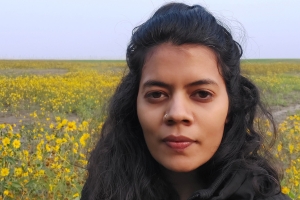
Grantee: Aditi Patil (Conservation indica)
Grassroots Conservation Small Grant
Project: Mitigating Brown Bear-human Conflict in Jasrath and Neighbouring Villages of Lahaul Through Non-invasive Solutions
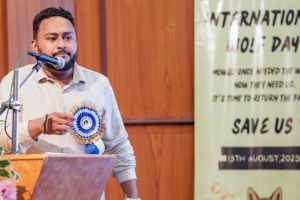
Grantee: Dr. Arkajyoti Mukherjee (Wildlife Information and Nature Guide Society)
Grassroots Conservation Small Grant
Project: Landscape-Level Assessment and Conservation of Indian Grey Wolves in Eastern India: A Focus on Purba Bardhaman, West Bengal
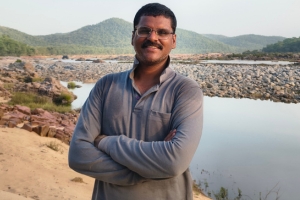
Grantee: M Suraj (Nova Nature Welfare Society)
Wildlife Research Small Grant
Project: Community Stewardship – Local Action to Save Last Remaining Wild Buffaloes in Chhattisgarh
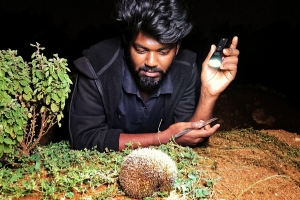
Grantee: Abinesh Muthaiyan
Wildlife Research Small Grant
Project: Assessing and Mitigating Pesticide and Human-induced Threats in Madras Hedgehog Habitats Through Community Conservation in Tamil Nadu
Through the small grants programme, WCT has supported 24 conservation and research projects impacting more than 15 threatened species, so far.
You can learn more about some of our previous grant awardees and their projects below:

